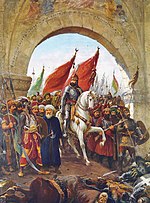1453
Appearance
| Millennium: | 2nd millennium |
|---|---|
| Centuries: | |
| Decades: | |
| Years: |
| 1453 by topic |
|---|
| Arts and science |
| Leaders |
| Birth and death categories |
| Births – Deaths |
| Establishments and disestablishments categories |
| Establishments – Disestablishments |
| Art and literature |
| 1453 in poetry |
| Gregorian calendar | 1453 MCDLIII |
| Ab urbe condita | 2206 |
| Armenian calendar | 902 ԹՎ ՋԲ |
| Assyrian calendar | 6203 |
| Balinese saka calendar | 1374–1375 |
| Bengali calendar | 860 |
| Berber calendar | 2403 |
| English Regnal year | 31 Hen. 6 – 32 Hen. 6 |
| Buddhist calendar | 1997 |
| Burmese calendar | 815 |
| Byzantine calendar | 6961–6962 |
| Chinese calendar | 壬申年 (Water Monkey) 4150 or 3943 — to — 癸酉年 (Water Rooster) 4151 or 3944 |
| Coptic calendar | 1169–1170 |
| Discordian calendar | 2619 |
| Ethiopian calendar | 1445–1446 |
| Hebrew calendar | 5213–5214 |
| Hindu calendars | |
| - Vikram Samvat | 1509–1510 |
| - Shaka Samvat | 1374–1375 |
| - Kali Yuga | 4553–4554 |
| Holocene calendar | 11453 |
| Igbo calendar | 453–454 |
| Iranian calendar | 831–832 |
| Islamic calendar | 856–857 |
| Japanese calendar | Kyōtoku 2 (享徳2年) |
| Javanese calendar | 1368–1369 |
| Julian calendar | 1453 MCDLIII |
| Korean calendar | 3786 |
| Minguo calendar | 459 before ROC 民前459年 |
| Nanakshahi calendar | −15 |
| Thai solar calendar | 1995–1996 |
| Tibetan calendar | 阳水猴年 (male Water-Monkey) 1579 or 1198 or 426 — to — 阴水鸡年 (female Water-Rooster) 1580 or 1199 or 427 |
Year 1453 (MCDLIII) was a common year starting on Monday (link will display the full calendar) of the Julian calendar. It is sometimes cited as the notional end of the Middle Ages by historians who define the medieval period as the time between the Fall of the Western Roman Empire and the fall of the Byzantine (Eastern Roman) Empire.
Events
- April – Tarabya and Studius are taken by the Ottoman Empire in preparation for the assault on Constantinople, as are the Prince Islands, by the Ottoman fleet under Admiral Baltaoglu.

- April 2–May 29 – Siege and Fall of Constantinople: The Ottoman Sultan Mehmed the Conqueror ends the Byzantine (or Eastern Roman) Empire after more than a thousand years by capturing the capital, Constantinople (modern-day Istanbul). Mortars are perhaps used in battle for the first time in this action. The consequent closure of the traditional overland route from Western Europe to the Far East and need to identify new maritime routes leads to the Age of Discovery and ends the Middle Ages.[1]
- May 22 – Partial lunar eclipse.
- July – Revolt of Ghent: Philip the Good, Duke of Burgundy, crushes the Ghent rebellion.

- July 17 – Battle of Castillon: The French under Jean Bureau defeat the English under the Earl of Shrewsbury, who was killed.
- October 10 – Sejo of Joseon killed his enemy Kim Jongseo, and gained control of the government. In Korean, this rebellion is called Gyeyujeongnan.
- October 19 – The Hundred Years' War comes to a close with the French recapture of Bordeaux, leaving the English retaining only Calais on French soil.
Births
- January 1 – Bernardin Frankopan, Croatian nobleman, diplomat and soldier (d. 1529)
- February 6 – Girolamo Benivieni, Florentine poet (d. 1542)
- March 2 – Johannes Engel (d. 1512)
- March 3 – Philip II, Count of Waldeck-Eisenberg (1486–1524) (d. 1524)
- March 25 – Giuliano de' Medici (d. 1478)
- April 18 – Margaret of Brandenburg, abbess of the Poor Clares monastery at Hof (d. 1509)
- May 13 – Mary Stewart, Countess of Arran, Scottish princess (d. 1488)
- June 10 – Francesco Soderini, Catholic cardinal (d. 1524)
- September 1 – Gonzalo Fernández de Córdoba, Spanish general and statesman (d. 1515)
- October 13 – Edward of Westminster, Prince of Wales (d. 1471)
- November 13 – Christoph I, Margrave of Baden-Baden (1475–1515) (d. 1527)
- November 17 – Alfonso, Prince of Asturias (d. 1468)
- November 22 – Jacob Obrecht, Flemish composer (d. 1505)
- probable – Afonso de Albuquerque, Portuguese admiral (d. 1515)
Deaths
- February 28 – Isabella, Duchess of Lorraine (b. 1400)
- May 29
- Constantine XI Palaiologos, last Byzantine Emperor ("Last Roman Emperor")
- Ecumenical Patriarch Athanasius II of Constantinople (all killed in, or shortly after, the siege of Constantinople)
- Demetrios Palaiologos Metochites, last governor of Constantinople
- June 1 – Giovanni Giustiniani, Italian captain
- June 2 – Álvaro de Luna, Duke of Trujillo, Constable of Castile
- June 3 – Loukas Notaras, last megas doux of the Byzantine Empire
- June 4 – Andronikos Palaiologos Kantakouzenos, last Grand Domestic of the Byzantine Empire
- July 17
- Dmitry Shemyaka, Grand Prince of Moscow 1445, 1446–1447, poisoned in Veliky Novgorod by Vasily Tyomny's agents
- John Talbot, 1st Earl of Shrewsbury, English military leader
- July 20 – Enguerrand de Monstrelet, French chronicler
- December 24 – John Dunstaple, English composer (b. 1390)
- Demetrius III, former co-king of Georgia (b. c. 1413)
References
- ^ Crowley, Roger (2006). Constantinople: The Last Great Siege, 1453. Faber. ISBN 0-571-22185-8. (reviewed by Foster, Charles (September 22, 2006). "The Conquestof Constantinople and the end of empire". Contemporary Review. Archived from the original on March 27, 2007.
It is the end of the Middle Ages
{{cite web}}: Unknown parameter|deadurl=ignored (|url-status=suggested) (help)) (Archived Link)
